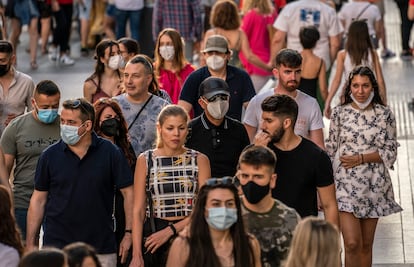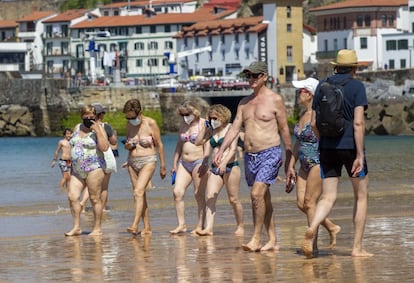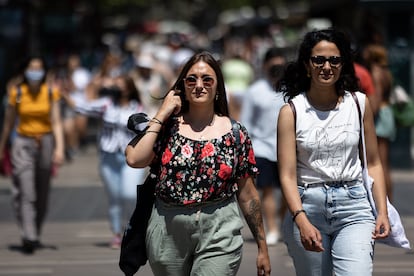Despite eased rules, outdoor masking endures in Spain
While some people removed face coverings on Saturday, others kept them on out of concern about the delta variant and a fresh outbreak in Mallorca


Spain eased its face mask rules on Saturday, more than a year after making face coverings mandatory in many situations. From now on, they are no longer necessary in outdoor settings where social distancing is observed. Scenes across the country this weekend showed a mixed reaction to the new rules: while many citizens walked around maskless, many others chose to keep theirs on.
In Barcelona’s Vila de Gràcia square, dozens of people waited on Friday night until the clock struck midnight, then tossed their masks up in the air amid loud cheering. “I was looking forward to taking it off, although I’m scared too. My father died of coronavirus and I have some reservations,” said Verónica Amot, 48. Standing not far from there, Toni Garcia, 34, remained covered. “I will continue to use it a few more weeks,” he said. “The virus has not gone away and the epidemic is going to explode once again.”
Although the eased restrictions come with limits – masks will still be required in outdoor situations where it is not possible to maintain a safety distance of 1.5 meters between people – the change comes at a delicate moment for public health.

On the positive side, over 50% of citizens have had at least one dose of a Covid-19 vaccine and the incidence rate has been declining since April. But new infections have been increasing again for the last four days, there has been a recent mass outbreak in Mallorca linked to student parties, and authorities are concerned about the delta variant of the virus, which has already forced Portugal and the United Kingdom to reintroduce restrictions.
Health Minister Carolina Darias said on Thursday that “masks are making way for smiles,” but she also cautioned that the transition should be made “progressively and prudently.” And health authorities reminded citizens to always carry a mask around in case they need it.
“The problem is not removing face masks, it’s the way the message is being delivered,” noted Juan García Costa, vice-president of the Spanish Virology Society. “I’m scared about how young people are going to use this information. The pandemic is not over.”

Carlos Losada, an official with the National Association of Clinical and Resident Psychologists, said that change of any kind always requires a period of adaptation. “There could be some people with more phobic feelings. The best way to proceed is for each person to follow their own pace,” he said.
Begoña Elizande, a psychologist and expert on grief, agreed. “Some people will burn it [the face mask] in a bonfire and others will keep it on because it helps with their sun allergy or because it makes them feel more protected.”
But Antonio Sanz, who teaches psychology at Barcelona’s Autonomous University, thinks that the transition will not take too long: “If people adapted quickly to wearing masks, the adaptation to not wearing one will also be quick.”
Masking became mandatory after the government issued a June 2020 decree that was later sent to parliament to be encoded into law. In the beginning, the covering was only required when social distancing was not possible, although regional governments had leeway to introduce tougher conditions. By the time the legislation received Senate approval in March 2021, it had been rewritten to make outdoor masking required at all times.
Citizens have, on the whole, been quick to adopt the safety measure: according to the latest survey by the Center for Sociology Studies (CIS), 99.4% of Spaniards use a mask regularly.
English version by Susana Urra.
Tu suscripción se está usando en otro dispositivo
¿Quieres añadir otro usuario a tu suscripción?
Si continúas leyendo en este dispositivo, no se podrá leer en el otro.
FlechaTu suscripción se está usando en otro dispositivo y solo puedes acceder a EL PAÍS desde un dispositivo a la vez.
Si quieres compartir tu cuenta, cambia tu suscripción a la modalidad Premium, así podrás añadir otro usuario. Cada uno accederá con su propia cuenta de email, lo que os permitirá personalizar vuestra experiencia en EL PAÍS.
¿Tienes una suscripción de empresa? Accede aquí para contratar más cuentas.
En el caso de no saber quién está usando tu cuenta, te recomendamos cambiar tu contraseña aquí.
Si decides continuar compartiendo tu cuenta, este mensaje se mostrará en tu dispositivo y en el de la otra persona que está usando tu cuenta de forma indefinida, afectando a tu experiencia de lectura. Puedes consultar aquí los términos y condiciones de la suscripción digital.








































